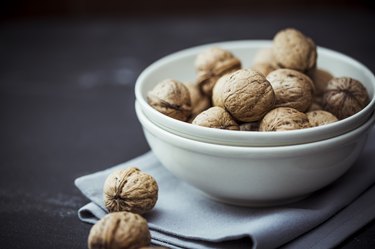
Nuts are a nutritious, high calorie snack. They provide healthy fats and protein. For some people, nuts like walnuts are a trigger food for gastrointestinal distress. Nuts have a high fiber content and can be difficult to digest during a GI flare up. On the other hand, nuts and nut butters can be great foods to gain weight if you have irritable bowel syndrome. Depending on your condition and symptoms, it is important to consider how nuts will affect your gut.
Nut Sensitivity
Video of the Day
Tree nuts and peanuts are top food allergies. While very dangerous, nut allergies will not really involve your GI tract. A nut intolerance affects digestion. Nut intolerances are generally less severe, but can make you feel bloated and uncomfortable. If you suspect that nuts are the cause of your GI symptoms, try cutting them out of your diet for a week or so. Slowly reintroduce them and keep track of how you feel. If you experience gas, bloating, diarrhea, nausea, headaches or stomach pain, one to four hours after ingesting nuts, you may be intolerant. Talk to your doctor about your symptoms. To treat nut intolerance, you may have to avoid certain nuts.
Video of the Day
Diverticulitis
Diverticulosis is a condition where your intestinal tract develops weakened out-pouches, similar to small, intestinal hernias. If these pouches become inflamed, the condition is called diverticulitis. Diverticulitis symptoms include severe GI pain, fever and blood in stool. In the past, diverticulosis patients were advised to avoid nuts and seeds because these foods were suspected to cause a flareup.
In 2008, The American Medical Association published a study questioning this treatment method. The 18-year study found that diverticulitis flareups were not strongly associated with consumption of nuts and seeds. Furthermore, these foods may be protective against the development of diverticulosis. If you have diverticulosis, talk to your doctor about whether you should include nuts in your diet. Eating nuts and seeds as part of a healthy diet may lower your risk of getting diverticulosis.
Bowel Conditions
Irritable bowel syndrome describes the inappropriate contraction of intestinal muscles causing cramps, pain and abnormal frequency of bowel movements. Another similar group of conditions, called inflamed bowel disease includes Crohn's disease and ulcerative colitis. Diarrhea and malabsorption are common symptoms of these GI conditions, and management of bowel disorders is often life-long. Because nuts are high in calories and protein, they can help you preserve your lean body mass. Peanut butter, walnuts and other nuts can keep you from losing weight related to malabsorption. Unless nuts are a trigger food for your symptoms, try snacking on them to bulk up your diet.
Go Nuts
While nuts have the potential to elicit negative GI symptoms in certain people, they are otherwise a healthy addition to most diets. Gastrointestinal issues often involve diarrhea and constipation symptoms. Because nuts are naturally high in fiber, they help to promote regularity. Adding peanut butter to smoothies or almonds to trail mix can help you get more calories and protein to fight off malnutrition. If weight loss is not a concern for you, consume nuts in moderation to avoid exceeding your daily calorie needs.